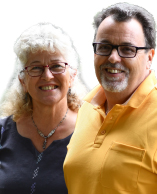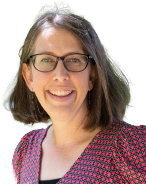
From internet cafés to international Zoom coffee
As technology has evolved, so it has impacted the lives of mission workers. Megan and Alan Barker, who have served long-term in Nepal with BMS, and the Chad-based Claire Bedford share their experiences
Megan and Alan Barker first began serving with BMS World Mission in 2000, and have lived and served in Nepal for most of the intervening years. They are currently in the capital Kathmandu, to develop a wider itinerant role for capacity strengthening of BMS partner organisations. As part of this they (especially Alan) give particular input to HDCS, a locally based partner.
Technology-wise, much has changed since they first arrived in Nepal.
“When we came, it was very difficult to get hold of people at home and so we focused on settling into here,” says Megan. “There was dial-up internet, but we didn’t have a computer and had to use internet cafés. We would write letters home and postcards – they were our ways of keeping in touch. And because there wasn’t a safe postal system, we could only send them when someone was travelling to the UK and could carry them home for us.
“The lack of connection actually reduced the anxiety on both sides – you didn’t expect to be connected so easily.”
“The internet here is very good these days,” adds Alan, “but it can go down – and that’s when people can start to worry. But overall it’s been very helpful.”
The Barkers use WhatsApp and Zoom to keep in touch with friends and family (their three children all live in different countries) and communicate with churches. They say Covid, with people getting used to video conferencing platforms like Zoom and online church services, has ‘changed the game completely.’
Having a Zoom coffee morning and afternoon tea around once a quarter is one of the ways the couple have enhanced their relationships with supporting churches. “With the technology now, you can have people from different places together,” says Megan. “We connect our churches from across the UK through our afternoon teas and coffee mornings. Anybody can come and we just sit and chat for an hour. They talk with us and each other, and it’s a great way of keeping in touch. It’s interesting for us as they connect with each other through mutual contacts and past friendships. Sometimes it’s a general chat and catch up, other times we have specific things to share: for example, when we moved here we actually did a tour of the house, and people felt they’d visited us. It means when we go to our churches, we feel like we know people well because we have engaged with them. So for us, that’s been successful.”
As well as building relationships individually, Megan and Alan are better able to connect with supporting congregations: they’ve taken part in several online services, and regularly watch services from their link churches. They’ve found more of a captive audience online – people are not pulled in as many directions as they might be on an onsite visit. They’ve led online Bible studies, and recorded items for Sunday schools, like ‘what’s it like at Christmas in Nepal?’
Technology has also meant their roles in Nepal have adapted.
The job they’re doing ‘wouldn’t be possible without it’, they say, as it involves organising webinars and evaluating projects where there is a depth of detail and need for speedy responses. In terms of her rehabilitation work, Megan, an occupational therapist, can even support people online.
“Digital technology has definitely improved things for us in many ways,” says Alan. Nevertheless, there remains a place for the onsite, face-to-face.
“You always have to strike a balance. Here in Nepal it’s a very relational culture, less task focused. You have to meet and get to know them properly. And obviously drink tea. Through this we start to build a relationship, and then start talking about work. It’s not usually the first thing on the agenda even though that is the ultimate aim.”
 |
Alan and Megan Barker serve in Nepal, where they use their skills to support BMS World Mission partner organisations, train local workers and deliver vital physiotherapy |
A positive thing - but important not to have your brain too much back in the UK
Claire Bedford has served with BMS since 2013. She works in the BMS-supported Guinebor II hospital, in Chad, heading up the pharmacy service there and supporting many other aspects of the hospital too. Claire is originally from North Devon and her home church is Upton Vale Baptist Church, Torquay.
Technology has impacted life for the better in a number of ways, though its use needs to be moderated.
“The first thing that has definitely changed in the last 10 years is the internet availability,” Claire says. “No one had smartphones here, the internet was all on a dongle, and was very slow.
“While it’s still pretty expensive, there’s mobile data, people have smartphones, the Chadians use WhatsApp and Facebook. It’s not everybody - some people don’t even have a phone, but it’s taken off in the last two or three years.”
This has saved time in her work - orders can be checked quickly and easily over WhatsApp, and Claire and her team have just been introduced to an online ordering system. “I never thought I would see this,” she says.
The advances in technology have also served to improve connections with her home church and play a role in sustaining her faith. Claire’s priority is involvement with her church in Chad, but if she is ill, or the road impassable in the rainy season (there are no tarred roads for the first section of the 10km journey from the hospital to the capital N’Djamena) she now has the option of tuning in to Upton Vale’s livestream on YouTube on a Sunday morning.
As a member, she can attend church meetings, and Upton Vale also hosts online prayer meetings on Sunday evenings. “I don’t go every time but when there’s a focus on mission or the mission work, I’m asked to go. I can have people praying for me in real time and I can hear them.
That’s the biggest way things have changed for me since Covid - being able to do stuff in real time is an encouragement.”
She says it needs to be as balanced. “It’s important not to have your brain too much back in the UK, but it has definitely been a positive thing in terms of feeling supported and linked in.”
 |
Claire Bedford serves at Guinebor II Hospital in Chad. There, she has an important role in the hospital’s management, as well as heading up and training the pharmacy team. |
Click here to
download a pdf version of this article
Title images | Vextok and FreePik